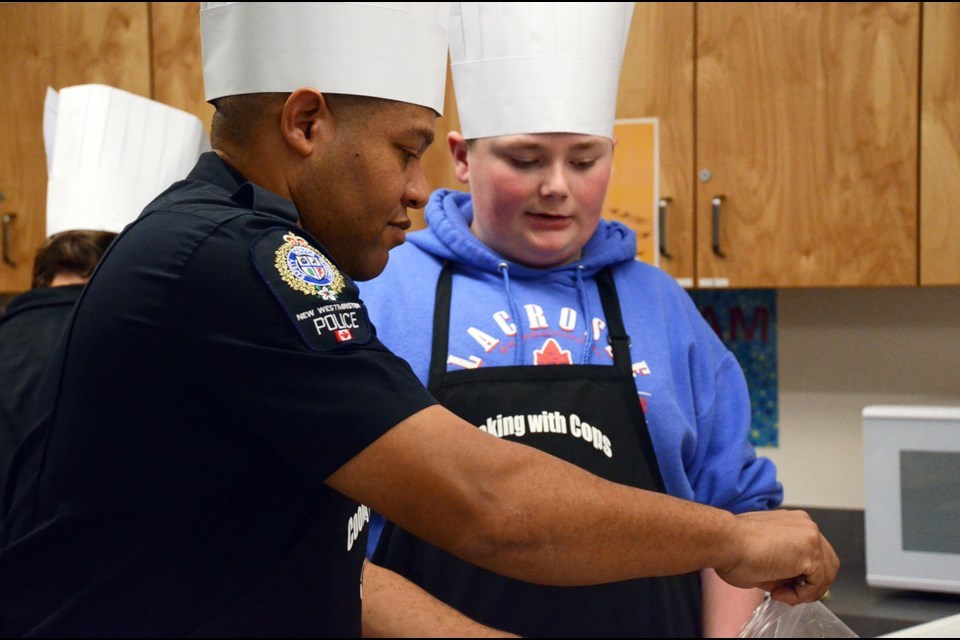The New Westminster school board will make a final decision tomorrow night on the future of its police liaison program.
The board’s education committee – which is made up of all the same trustees as the full board – voted at its April 13 meeting to recommend the board discontinue the child and youth liaison program.
The three officers who normally work in the district’s schools are all funded by the New Westminster Police Department. They have been reassigned to other duties during the 2020/21 school year pending a program review by the school district.
The education committee’s decision stemmed from concerns over the harm that police presence in schools has on racialized communities, in particular Black and Indigenous students and staff.
Since that vote, the school board has received numerous letters from community members on both sides of the discussion.
Among those disappointed by the vote was retired New Westminster police officer Ted Usher.
“Yes, there are many ugly sides of law enforcement, and they are emblazoned on the nightly news and social media every day, but most of what our kids see is from the U.S.A., and our society and theirs, similar in many ways, is far different when it comes to law enforcement and our laws,” Usher wrote.
Usher cited benefits to students in getting to know police officers through the program.
“I know first-hand from experience what our high school liaison officers have done over the many years to help protect students from bullying and getting mixed up with youth gangs and travelling down the wrong road,” he wrote. “Who is going to do that now!”
TRAUMA TO BIPOC, LGBTQ+ STUDENTS
On the other side of the discussion, Kathleen Oliphant wrote to the board before its April 13 vote, urging them to discontinue the program.
“As a school board, I believe a big part of your role is to ensure you protect the most vulnerable students. For many Black, Indigenous, People of colour and LGBTQIA2S+ students, police presence in their school is traumatizing. Our police system is built on a colonial legacy of direct harm to Indigenous and Black communities,” she wrote.
“We need to put ourselves in the shoes of the kids who have grown up with traumatizing experiences with police and end this program.”
Multiple other letter-writers also lauded the board for the education committee’s vote.
“We know that this action by your district will be a critical step in breaking the devastating school-to-prison pipeline that disproportionately impacts marginalized communities that are over-policed and under-protected,” reads one letter, sent in by numerous community members. “Integral to this policy is eradicating all barriers for children to attend school so that they can receive an education free of trauma and/or fear. By ending the (school liaison officer) program in SD40, we help achieve this human rights goal.”
Another district parent, Laura Kwong, wrote to acknowledge that the program should be viewed through the lens of systemic racism.
“I absolutely agree that even though there are 1000s of parents who would like to see the program continue, the voices saying that the program triggers trauma or doesn't allow them to feel safe in their school must outweigh the 1000s,” she wrote. “This is a very difficult thing to understand if you are one of the 1000, asking why your voice does not matter.”
NEW WORKING RELATIONSHIP
But Kwong also raised some cautions about what the cancellation of the program could mean for students, including those who received support and resources from it.
“We can not pull out one support system without replacing it with another,” she wrote.
She also said schools can play a part in creating a working relationship between the NWPD and the community.
“If we want our police to do better, and to be better, we must be working together on the same page,” she wrote. “We can set a new standard for expectations, but we must be working together. That’s how education works, doesn’t it?”
A letter from school board chair Gurveen Dhaliwal to NWPD Chief Dave Jansen (included in the agenda package for the April 27 meeting) acknowledges the partnership the school district and police have shared over the years and notes the vote is not a reflection of the police department or the people who work in it.
Dhaliwal’s letter says the district looks forward to reimagining its relationship with the police.
“After all, we share core values in our desire to create safe communities and care for the people we’re each here to serve. And we know we have inter-connected and important roles to play in supporting the students, staff and families of New Westminster,” Dhaliwal wrote. “Again, while this marks the end of a program, it is not the end of a relationship. We look forward to working with you and your team to determine what that will look like.”
The final vote on the police liaison program will take place during the Tuesday, April 27 New Westminster school board meeting, which will be held virtually via Webex. Board meetings are public, and everyone is welcome to attend.
Follow Julie MacLellan on Twitter @juliemaclellan.
Email Julie, [email protected].


